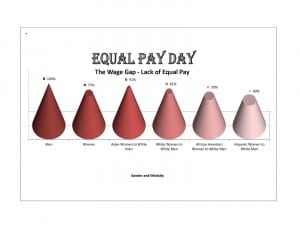Nowhere Near Equal
April 17, 2012
 Reflections on Equal Pay Day by Kathy Groob, Publisher ElectWomen Magazine
Reflections on Equal Pay Day by Kathy Groob, Publisher ElectWomen Magazine
Tonight I’ll be speaking to the Coshocton Ohio Chapter of The Business & Professional Women’s Organization in honor of Equal Pay Day. The National Committee on Pay Equity first initiated equal Pay Day in 1996. It’s always on a Tuesday, to represent how far into the workweek women have to work in order to earn what men earn for equal work. Because women on average earn less than men, they must work longer to earn the same amount of pay.
Women who work full time earn about 77 cents for every dollar men earn. Compared to white men, African American women make 70 cents on the dollar (African American men make 74 cents); Hispanic or Latina women make about 60 cents (Hispanic men make almost 66 cents).
The National Committee on Pay Equity, along with hundreds of women’s organizations across the globe believe that equal pay for equal work is a simple matter of justice for women.
 Wage discrimination impacts the economic security of families today and directly affects retirement security as women look down the road.
Wage discrimination impacts the economic security of families today and directly affects retirement security as women look down the road.
But despite the Equal Pay Act and many improvements in women’s economic status over the past 48 years, wage discrimination still persists and is attributable in part to the Equal Pay Act’s limited scope. Not only does it fail to cover wage discrimination based on race (although Title VII of the 1964 Civil Rights Act does), it also fails to provide equal pay for jobs that are comparable but not identical. Further, it excludes part-time or contingent workers, and does not allow groups of workers to file class action suits.
I’ve spent over 30 years as a businesswoman and have my fair share of stories about feeling discriminated against, undervalued for the results I was producing, and being paid less than what I was worth. Until I left to run for the Kentucky Senate, I was a Vice President at a large real estate development and construction firm. I was the first female at the executive level in my company and working in an industry that was heavily dominated by men.
Most days I was the only female in meetings and attending industry events. Over time I was able to make positive changes for the women in the organization and helped recruit other women at leadership levels.
The National Committee on Equal Pay has a website and on it is a list of suggestions for what employers and individuals can do to promote equal pay for women.
One of the items for individuals is to contact your state legislators and members of Congress asking them to support equal pay legislation.
But with the majority of those state legislative and Congressional members being men, how much of a priority will it be for them to level the playing field for men?
Without enough women in elected office, women in business, women in law enforcement, education, health care and even in the entertainment and movie businesses, we will continue to be under valued and under paid.
Until we are fully represented at the highest levels in this country, women must band together, support each other and work to advance women in the workplace and in politics. Whe one woman succeeds, we all succeed.
Information provided by the National Committee on Equal Pay.
